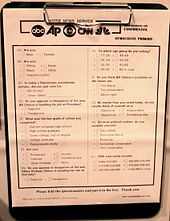Tis the season to hate on polls, and from Jill Lapore in the New Yorker to Brooke Gladstone at On the Media, the verdict is that they A Bad Thing for the American electoral process. Put me down as a dissenter.
Sure, polling is an inexact science that has gotten more inexact in recent years. There are geographically untethered cell phones to factor in. Between Caller ID and sheer grumpiness, increasing numbers of citizens decline to answer — and when they do, they may be fibbing more than before. This year there have been notable failures to accurately predict election results from Israel to Great Britain to Kentucky.
And perhaps the media do pay a little too much attention to polls. A year or more before an election is held, a lot of Americans are barely paying attention to who their next congressman, senator, or president will be. So there is limited value in asking who they would vote for “if the election were held today.” Etc.
But consider the alternative. Imagine that a total of zero polls had been conducted in the present presidential campaign.
Jeb Bush would still be being sold as the Republican front-runner. Donald Trump would be considered merely joke-worthy. Rick Perry and Scott Walker would still be with us. No one would ever have known that Ben Carson once enjoyed significant support. Crowds or no crowds, Rand Paul would have been treated as consequential. Crowds or no crowds, Bernie Sanders would have been treated as inconsequential.
In other words, we would be viewing the campaign from inside the green room even more than we are now. Wise heads in the media would be talking to wise heads in the parties would be talking to spinmeisters in the campaigns. A report from the field of popular enthusiasm or its absence regarding a particular candidate would be dismissed by the editor’s desk if it ran against the wisdom of the moment. A well-delivered debate one-liner would mean the difference between contender and also-ran.
Horse-race polling may be imperfect, but it provides a way for ordinary people to register their views, collectively and tranche by tranche. And if you think ordinary people aren’t paying attention to the campaign at this point in time, go to Iowa or New Hampshire or South Carolina.
Nor is it just that polls provide a check on the pundit class. They also provide clues to what the campaigns themselves are up to — in a way that enables reporters to shine a spotlight on the forces at work in the electoral process. In my little corner of the media world, white evangelicals are of particular interest. They are the single largest voting bloc in the GOP — the creation of the religious right that has profoundly affected national politics since 1980.
Happily, white evangelicals are asked to identify themselves as such (or not) in many national polls as well as in most polls in states with large evangelical populations. This has provided the empirical evidence to identify the source of Ben Carson’s early support, and to track its shift to Ted Cruz as Carson has faded as a candidate.
Now tell me that is false, uninteresting, or worthless information.






